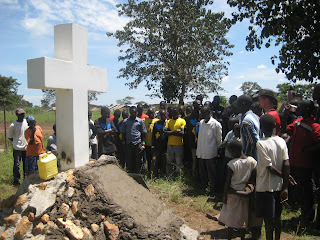The Truck
One of the notorious truths about Karamoja is that the roads are, what? Awful!!! As the natural resources of Karamoja are becoming known to the outside world, more and more rock trucks come lumbering up the road to exploit these resources. But the roads were not made to support multiple tons of rock and truck, and the trucks were not made to support the roads, and so they get stuck. And when they get stuck they create craters and ruts that become saturated with rain water and make the road nearly impassible for everyone. Thus a sturdy, 4X4 vehicle is a necessity for life in Karamoja.
When Dr. Jean first arrived here, back in 1998, she bought an old Land Cruiser that had been used in Sudan as an ambulance. So the seats in the back sit sideways and the suspension is nearly shot from years of hard driving on rough roads. During the time of great unrest, she added the cow horns to the front as a symbol that she came in peace, as a protector and helper of the cows and not as an enemy. God used these horns to help save her life several times as she drove through very dangerous territory. Now, as peace begins to settle in the land, the horns still represent our friendship and connection to the people and the cows. As we drive the vehicle, people will often rush to the road to wave at us and shout “Nakaala, Nakaala!” which is Jean’s Karamojong name.
Now that Tom and Jean are leaving the field the truck goes back to CVM (Christian Veterinarian Missions, whom Jean was with). I had the opportunity to buy the truck, but have chosen not to. As much as I like the truck for sentimental reasons, I recognize that it is not a reliable vehicle for me. Since I am not much of a mechanic, I need something that I can trust will get me to my destination (without costing me hundreds of dollars worth of fuel and repairs). So it is with sadness that I say goodbye to this great truck. I have actually really enjoyed learning how to drive it (left-side manual transmission), and taking on the challenges of the roads with it (love the adrenalin rush that comes from conquering the really muddy spots).
But since I am not buying this truck, and since it is necessary to have a truck for Karamoja, I must look into buying a new truck for me/the team. Vehicles here are very expensive. In addition to the initial cost of the vehicle, you also have to pay import taxes which can nearly double the price. Thus, for a good, used land cruiser you can pay about $17,000.00. I had initially thought that I would buy a motorcycle to travel around Karamoja (much cheaper), but with the changes of team dynamics, I know that I need a real vehicle instead of just a motorbike. So I am asking for your help. If you would like to contribute to buying a vehicle, you can send your donation to Pioneers (follow the directions below) and add a slip of paper specifying “vehicle funds”. I really appreciate your help in this. It is a need I cannot meet on my own. CVM has allowed me to continue to use the truck until March, 2013, so the sooner the funds come in, the better. Thank you!
Thank you for your faithful friendship and prayers.
Summer
Philippians 4:13 "I can do all things through Christ who strengthens me." Deuteronomy 31:6 "Be strong and of good courage, do not fear nor be afraid of them; for the LORD your God, He is the One who goes with you. He will not leave you nor forsake you."
Please help support Summer's missionary work in Uganda by prayerfully giving through Pioneers by using the following link, and fill out the form. Thank you so much!
Website: https://webapps.pioneers.org/V2/giving/GiftInfo?name=Summer+Root&accountid=111084
Missionary Name: Summer Root
Account Number: 111084










